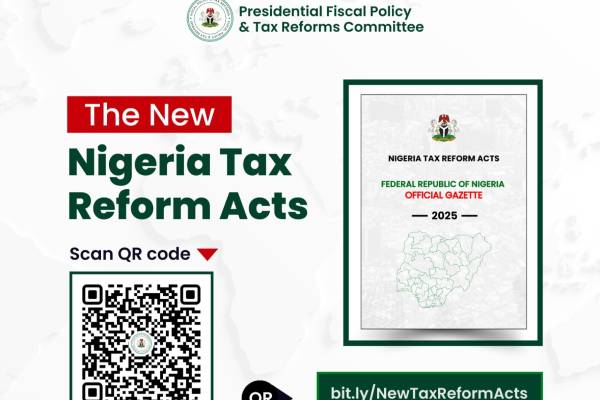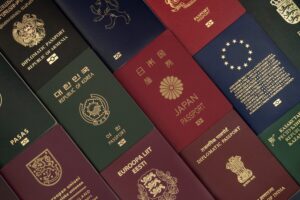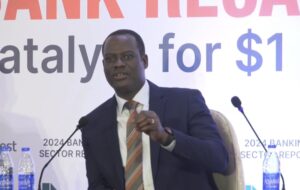Another wave of misconception has swept through social media amid the announcement of the Tax Identity number requirement for bank transactions linked to Nigeria’s latest tax reforms, sparking widespread concerns questioning what it meant for citizens.
The Chairman of the Presidential Committee on Fiscal Policy and Tax Reforms, Taiwo Oyedele, has shed light on the intricacies of the issue on his official X handle on Thursday, putting clarifications in place amid several speculative reviews flooding the media space following the recent passage of the Nigeria Tax Act, 2025, which streamlines and standardises previous tax laws.
Netizens have flooded the internet with speculative reviews of the new Tax Acts approved under President Bola Tinubu’s administration, questioning the reason behind mandating the Tax ID for banking transactions, with the biggest question asking why it’s required to open a bank account.
Oyedele clarified the claims, stating that the Nigeria Tax Administration Act, which mandates the use of Tax Identification Numbers for certain transactions, stating that it is a safeguard put in place to protect citizens while ensuring a fairer and more transparent tax system.
“The Nigeria Tax Administration Act (NTAA) mandates the use of Tax Identification Numbers (Tax ID) for certain transactions. Understandably, many Nigerians have questions about what this means for banking, businesses, and everyday life.
“This FAQ provides answers, clarifies misconceptions, and highlights the safeguards in place to protect citizens while ensuring a fairer, more transparent tax system,” Oyedele stated.
Below are some of the frequently asked questions on the New Tax Acts.
Is it true that everyone must obtain a Tax ID before opening or continuing to operate a bank account?
Yes, but with some clarifications. Section 4 of the NTAA requires all taxable persons to register with the tax authority and obtain a Tax ID. A “taxable person” is someone who carries on trade, business, or other economic activity to earn income. Banks and other financial institutions are required to request a Tax ID from taxable persons. Individuals who do not earn income and are not taxable persons are not required to obtain a Tax ID.
Is this requirement new?
No. This is not a new policy. It has been in place since the Finance Act, 2019, which amended section 49 of the Personal Income Tax Act. Since January 2020, individuals opening a business account have been required to provide a Tax Identification Number (TIN). The NTAA only strengthens and harmonises this requirement.
Why does the new law say “Tax ID” instead of Tax Identification Number
“Tax ID” is a term that unifies the different TINs issued by the Federal Inland Revenue Service (FIRS), Joint Tax Board (JTB), and State IRS. Ultimately, your NIN (for individuals) and CAC RC number (for companies) will serve as your Tax ID, reducing duplication and simplifying compliance.
If I already have a TIN, do I need a new Tax ID?
No. Your existing TIN remains valid. If you already have one, you do not need to register again. For those without a TIN, you will need your NIN (individuals) or CAC registration documents (companies) to process your Tax ID.
Will I need to queue for biometrics to obtain a Tax ID?
Read Also
The Tax ID is simply a unique number linked to your identity, not necessarily a physical card. To obtain it, you can visit the nearest FIRS, State IRS, or JTB office or apply online via their official websites. It is free of charge. Please do not patronise touts or unofficial agents.
Does the Tax ID requirement also apply to businesses?
Yes. For unincorporated businesses, your personal TIN/Tax ID is sufficient. For companies, NGOs, incorporated trustees, and other registered entities, a TIN will be automatically generated with your CAC registration details. If your business was registered without a TIN in the past, simply visit the FIRS or apply online with your CAC documents to get one.
What about Nigerians in the diaspora?
Nigerians abroad can obtain a Tax ID using their NIN for banking or investment purposes in Nigeria. A simplified process has been introduced for diaspora Nigerians. Visit the NIMC website for details.
Do foreign companies and non-resident entities need a Tax ID?
Yes, if they do business in Nigeria. A non-resident company supplying goods or services to Nigerian customers must register for a Tax ID. However, those earning only passive income (dividends, interest, royalties, rent) may not need to register, though they must provide relevant information. A company registered abroad but effectively managed or controlled in Nigeria is treated as resident and must comply.
Are government-owned enterprises and agencies exempted?
No. Section 5 of the NTAA requires all ministries, departments, agencies, and government-owned enterprises (federal, state, or local) to register for tax and obtain a Tax ID.
What happens if a taxable person does not register by January 1, 2026?
Without a Tax ID, a taxable person may not be able to operate bank accounts, insurance policies, pension accounts, or investment accounts. Sanctions also apply under the NTAA. However, individuals who are not taxable persons are not required to obtain a Tax ID.
How will this benefit ordinary Nigerians?
The aim is to simplify identification, reduce duplication, and close loopholes that allow tax evasion. For most individuals and businesses, their NIN or CAC RC number will serve as their Tax ID with no extra paperwork. This ensures fairness so that everyone who earns taxable income contributes their share while protecting low-income citizens who are not taxable. Follow us on social media and our WhatsApp channel for regular updates on the new tax reform laws.
TVC previously reported that a wave of uncertainty has swept social media amid reports of a potential five per cent fuel surcharge linked to Nigeria’s latest tax reforms, sparking widespread concerns about impending fuel price hikes.
The Chairman of the Presidential Committee on Fiscal Policy and Tax Reforms, Taiwo Oyedele, has shed light on the intricacies of the issue on his official X handle on Saturday, separating fact from speculation after several speculative reviews flooded the media space following the recent passage of the Nigeria Tax Act, 2025, which streamlines and standardises previous tax laws.
https://www.tvcnews.tv/5-fuel-surcharge-what-nigerians-should-know-tax-expert-clarifies/





